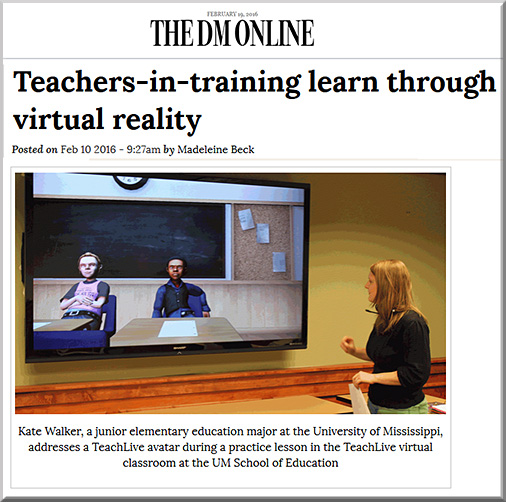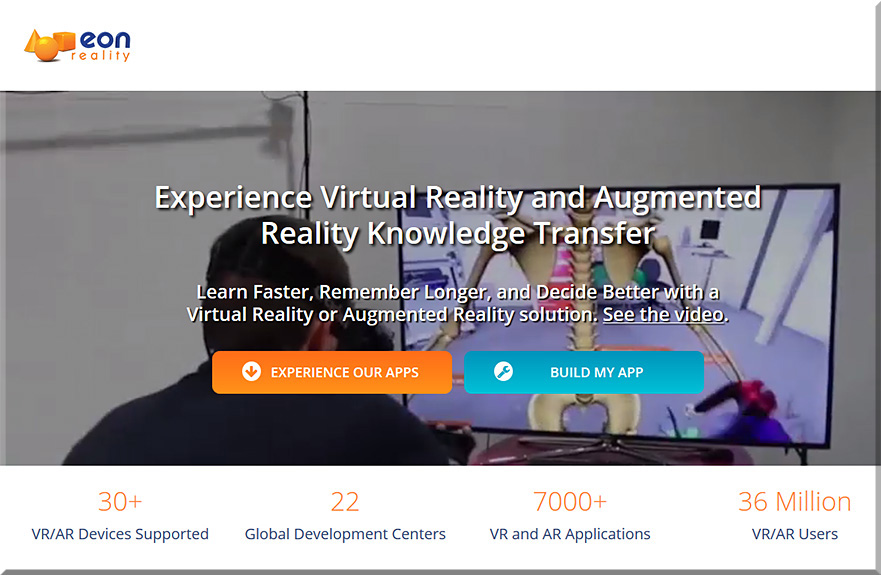2020 Vision: Experts Predict the Future of Virtual Reality — from vrscout.com by Eric Chevalier
Excerpt:
- VR will be the new internet.
- You will spend your flights in virtual reality.
- AR will beat VR.
- There will be no MMO. [yet]
- Virtual reality will change the film industry.
- Parallax technology won’t be able to support augmented reality.
- The space we’ll explore won’t be in the sky.
- We will see a MMO game with a million subscribers.
- The Divine Comedy will provide a model for successful VR storytelling.
- Robots will touch you in VR and you’ll like it.
- Journalism will be forever transformed.
Teachers-in-training learn through virtual reality — from thedmonline.com by Madeleine Beck
Excerpt:
The UM School of Education is using a program that allows teachers-in-training to practice classroom skills in a virtual setting before sending them into local elementary and secondary schools.
The simulated TeachLivE classroom consists of an 80-inch monitor with five student avatars. Each avatar has his or her own personality.
“All five avatar children are actually controlled by somebody in Florida, an actor or actress,” Dean of the School of Education David Rock said. “They’re set up with equipment so that if the actor raises his hand in Florida, the avatar child will raise his hand on the screen.”
EON Reality launches EON Creator AVR, a do-it-yourself augmented and virtual reality knowledge content creation application for teachers and students
EON Creator AVR empowers students and teachers to make engaging AR and VR knowledge transfer applications without programming skills.
Excerpt:
IRVINE, CA, February 16th, 2016 – EON Reality Inc., the world leader in Virtual Reality based knowledge transfer for industry, education, and edutainment, announced the upcoming release of EON Creator AVR (Augmented Virtual Reality), a mobile based application that enables users to easily create, share, collaborate, and publish Augmented Reality (AR) and Virtual Reality (VR) knowledge content. Using EON Reality’s patent pending Augmented Virtual Reality (AVR) technology, EON Creator AVR combines both Augmented Reality and Virtual Reality with a large AR/VR component library and assessment database to create one of a kind learning experiences. EON Creator AVR also leverages built in intelligence to help students and teachers quickly create highly interactive learning content directly on their tablets, smart phones, VR headsets, or AR glasses without requiring programming skills.
5 top augmented reality apps for education — from hongkiat.com by Gabriela Jugaru
Excerpt:
1. Google Sky Map
This is an augmented reality app which makes learning about astronomy interesting and fun. Instead of looking at descriptions of constellations in a book and then attempting to identify them in the sky, you can use Google Sky Map to directly identify stars and constellations using the camera on your smartphone.

How virtual reality could soon help stroke victims recover — from cnet.com by Max Taves
A $100 million investment in a Swiss startup highlights how VR offers more than just fun and games.
Excerpt:
Doctors could soon start prescribing an unusual solution to help stroke victims in the US: virtual reality goggles.
That’s the hope of Switzerland-based MindMaze, which on Wednesday got a $100 million investment to bring its blend of virtual reality hardware and neuroscience to market. The four-year-old startup’s technology has already won approval from regulators in Europe, where its applications for brain injury victims showcase what could soon be possible in the United States.
MindMaze’s 34-year-old founder and CEO Tej Tadi explains how: Imagine a stroke victim who’s lost control of her left hand but can still move her right hand. After putting on MindMaze goggles, the patient sees a 3-D image, or avatar, of her left hand that moves as she moves her right hand.
“That triggers areas in the brain to say, ‘Wait, let’s regain control of this hand’,” says Tadi. “The hand that was not working now works.” And that process of tricking the brain into seeing something that’s actually not there in the real world accelerates recovery, he says.
The Associated Press is partnering with AMD for more virtual reality journalism — from theverge.com by Adi Robertson
Excerpt:
After moving into virtual reality video journalism last year, the Associated Press is partnering with chip maker AMD for a new push into VR. Today, the companies announced that they’re launching a web portal for AP virtual reality, promising more journalistic endeavors soon — including “lifelike VR environments” built with the help of AMD.
Several news outlets have now started producing 360-degree videos, which can be watched through a Google Cardboard headset or a smartphone. The New York Times, which partnered with production house Vrse.works, offers documentary video about topics like child refugees and the 2016 presidential election in a dedicated NYT VR app. Vice has similarly partnered with Vrse.works, and ABC News worked with Jaunt to record a 360-degree version of a tour in North Korea. So far, the AP has partnered with a VR studio called RYOT, whose past work includes a short film about the April 2015 earthquake in Nepal.
Blippar’s new augmented reality app is supposed to recognize any object you point it at (video) — from recode.net by Lauren Goode
Excerpt:
But it’s safe to say that augmented reality is coming into a new phase: The contextual information being supplied is getting smarter, and people are gradually becoming more aware of the capabilities of AR and virtual reality (some are even excited to wear headsets, if you can believe it). So Blippar, in an effort to evolve along with the rest of the AR world, has just launched a new version of its smartphone app that is supposed to recognize literally any object you point at it — whether it has been “tagged” with an AR code or not.
Meta Unveils Incredible Augmented Reality Headset at TED — from uploadvr.com
Excerpt:
Redwood City-based Meta showed its latest AR glasses live on stage at TED in Vancouver.
The Meta 2 was demonstrated live by CEO Meron Gribetz with a person-to-person “call” showing a hand-off of a 3D model from a holographic person. Gribetz’ perspective was shown through the glasses as he reached out and took a model of a brain — a 3D hologram — from the hands of a colleague he saw projected in front of him.
“We’re all going to be throwing away our external monitors,” Gribetz said.












VR’s really exciting, isn’t it? I’m really looking forward to the new possibilities, but I’m not all that sure that VR will be the new internet. If anything, I’d say internet will be more about Augmented reality, but we can only speculate for now.
Yes, I hear you John. I think AR could be more widely used than VR, but as you mentioned, we can only speculate for now. I am seeing a ton of articles on VR and AR these days, with a lot of significant investments bein made in both areas.
Anyway, have a good week John!
Daniel